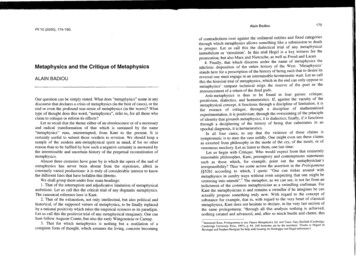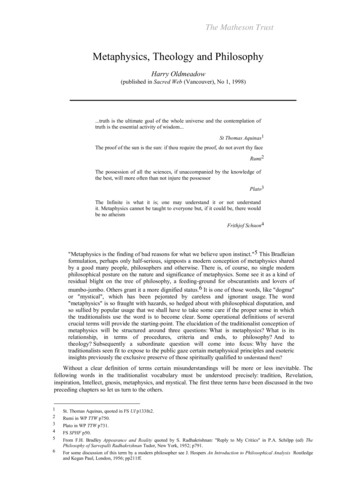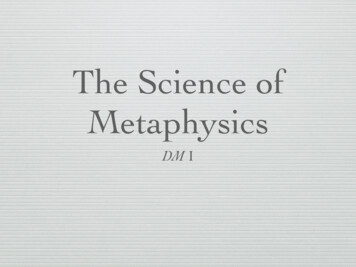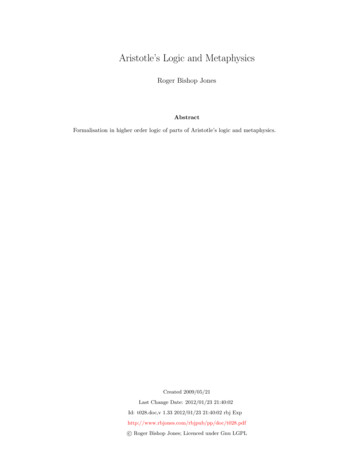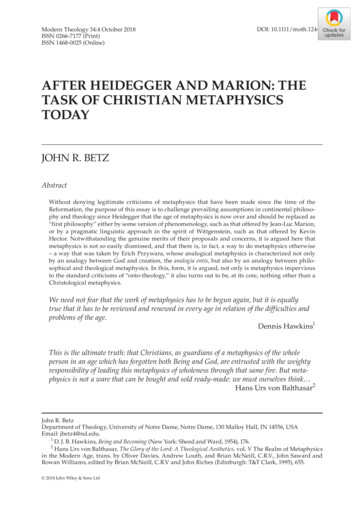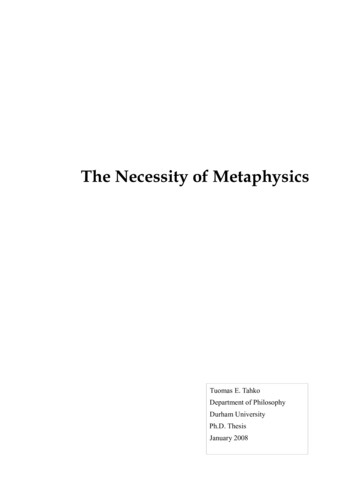
Transcription
The Necessity of MetaphysicsTuomas E. TahkoDepartment of PhilosophyDurham UniversityPh.D. ThesisJanuary 2008
ABSTRACTThe purpose of this thesis is to demonstrate that metaphysics is a necessary discipline –necessary in the sense that all areas of philosophy, all areas of science, and in fact anytype of rational activity at all would be impossible without a metaphysical backgroundor metaphysical presuppositions. Because of the extremely strong nature of this claim, itis not possible to put forward a very simple argument, although I will attempt toconstruct one. A crucial issue here is what metaphysics in fact is – the nature ofmetaphysics. The conception of metaphysics which I support could be calledAristotelian, as opposed to Kantian: metaphysics is the first philosophy and the basis ofall other philosophical and scientific inquiry. I will argue that this is indeed the mostplausible conception of metaphysics.The thesis consists of a brief historical introduction of certain important viewsconcerning the nature of metaphysics, namely Aristotle's, Kant's, Carnap's and Quine's,and of a longer survey of the status of metaphysics in the context of contemporaryanalytic metaphysics. I make some critical observations of recent accounts by peoplelike Hilary Putnam, Michael Dummett, Frank Jackson and Eli Hirsch before launchinginto a thorough analysis of the relationship between metaphysics and otherphilosophical and scientific disciplines.The central argument of the thesis is that our a priori capabilities, which I claim to begrounded in metaphysical modality and ultimately in essences, are necessary for rationalinquiry. Detailed accounts of a priori knowledge and modality will be offered in supportof this claim. In fact, my accounts of the a priori and modality are perhaps the mostimportant contributions of the thesis, as given this basis, the 'necessary' role ofmetaphysics in other disciplines should be quite obvious. I also pursue topics like themetaphysical status of logic and the law of non-contradiction as well as truthmaking, thesubstance of metaphysical debates, and the methodology of metaphysics. There is,however, a distinct theme which connects the broad range of topics that I discuss: theyare all analysed from a metaphilosophical point of view. Indeed, it could be said thatthis is a metametaphysical survey of the status of metaphysics. The upshot is an originalaccount of the status of metaphysics in contemporary analytic philosophy – theconclusion that metaphysics is the core of all our rational activities, from natural scienceto logic, semantics and truth.
PrefacePrefaceThis thesis is the culmination of a problem that has puzzled me since I was a little boy. Ican finally formulate that problem accurately: what is the fundamental structure ofreality and how can we reach knowledge about it? To answer this question – to evenapproach it – we need to turn to a discipline called metaphysics.My sympathies have always been with an Aristotelian, realist conception ofmetaphysics. During my philosophical career I have repeatedly tried to convince othersthat this is how we should understand metaphysics and this thesis is my latest effort toestablish that. My Master's thesis, Grounding Metaphysics: Metaphysical Necessity andEssentialism (2005), which I did at the University of Helsinki, focused on the technicaldetails of grounding a realist metaphysical system. In this thesis I have developed onmany of the same themes, but I have taken a more metaphilosophical approach here.Some of the results in this thesis have already been shared with the philosophicalcommunity. I have presented drafts of many of the chapters at international conferencesaround Europe, including Italy, Greece, Czech Republic, The Netherlands, Spain andthe UK. I am grateful to the organisers and audiences of these conferences. A paperpresented at Metafisica 2006 in Rome in July 2006, 'Metaphysics in Natural Science',which is based on the fifth chapter of the second part of the thesis, is forthcoming in theconference proceedings. Another paper, based on the first chapter of first part, 'TheAristotelian Method and Aristotelian Metaphysics', is forthcoming in the proceedings ofthe 2nd International Conference on Philosophy which was held in Athens in June 2007.1
PrefaceA paper entitled 'The Metaphysical Status of Logic', which is based on the 11 th chapterof Part II, is forthcoming in the proceedings of LOGICA 2007, held at HejniceMonastery, Czech Republic, also in June 2007. Finally, a paper based on chapter eightof Part II, 'A New Definition of A Priori Knowledge: In Search of a Modal Basis' isforthcoming in the journal Metaphysica (Vol. 9, No. 2, April 2008 ).My greatest debt is to my supervisor E. J. Lowe. His The Possibility of Metaphysics(1998) gave me hope of defending metaphysics proper, and was in fact the mainmotivation behind my Master's thesis. I have been fortunate enough to work with thebest possible person in regard to the project, and I am indeed very grateful. I would alsolike to express my gratitude to my friends and family in Finland who have supported mein many ways. The graduate community at the philosophy department in Durhamdeserves to be mentioned as well, I have had many insightful discussions with LloydTaylor, Paul Winstanley and Donnchadh O'Conaill, among others.During my time in Durham, I have received financial support from a number of sources.In 2005 I received an award from Helsingin Sanomain 100-year Foundation to fund thefirst year of my research. In 2007 I was accepted for a Teaching Fellowship scheme runby the Centre for Science Outreach of Durham University and funded by the CountyDurham Economic Partnership and the Ogden Trust. Finally, in 2007 I was awarded aprize by the Finnish Cultural Foundation for the completion of the thesis. I am mostgrateful to all of these institutions.2
ContentsPreface.1Introduction.4PART I: A Historical Survey of Metaphysics.181. The Aristotelian Method and Aristotelian Metaphysics.192. Kant and the Possibility of Metaphysics.353. Carnap's Anti-metaphysical Project.454. Quine's Conception of Metaphysics.555. Beyond Quine.67PART II: The Nature of Metaphysics.701. Putnam's Critique of Metaphysical Realism.712. Metaphysical Realism: the Putnam-Dummett-Goodman Challenge.823. Frank Jackson: Metaphysics as Conceptual Analysis.954. Eli Hirsch: Watered-down Metaphysics.1115. Metaphysics and Natural Science.1206. The Methodology of Thought Experiments.1307. The Relevance of Science to Metaphysics.1438. Metaphysics and the A Priori.1529. Modality and Metaphysics.17210. Truth and Metaphysics.19511. Logic and Metaphysics.20812. Semantics and Metaphysics.22613. When are Metaphysical Debates Substantial?.23814. Towards a New Methodology.25715. The Necessity of Metaphysics.268Conclusion.274References.279
IntroductionIntroductionThe primary purpose of this thesis is to defend a certain conception of metaphysics.According to this conception, metaphysics is a necessary discipline: whenever weengage in philosophy, science, or any rational activity whatsoever, there will be somemetaphysics involved. In fact, metaphysics is a necessary precondition for all rationalactivities. Because of the extremely strong nature of this claim, it is not possible to putforward a very simple argument. The first question that has to be dealt with is whatmetaphysics is. Thus, not only will we be dealing with metaphysics, but alsometaphilosophy, or, to use an emerging term, metametaphysics. Having said this, I willput forward a structured argument for the necessity of metaphysics. It will have to bedone in a piecemeal fashion, as there are a number of difficult problems to settle alongthe way. The key issues in this regard are the nature of a priori knowledge and its role inmetaphysics, modality and what it is grounded in, and the relationship betweenmetaphysics and natural science. The upshot of the thesis is a defence of a realistconception of metaphysics, its role in philosophy, and its importance for natural science;we will see that there is a fundamental continuity between metaphysics and science.Firstly, I should outline the main argument for the necessity of metaphysics. The initialhypothesis is that we need some kind of a metaphysical framework to be able to pursueother topics, even supposedly 'purely' empirical ones, such as natural science. The firstpart of the argument will motivate this claim by an examination of scientificmethodology. It will be argued that in a very clear sense, natural science relies on apriori reasoning. Observations of scientific thought experiments will be used to4
Introductioncorroborate this claim. More importantly, however, it must be clarified what is meant by'a priori' here, for my understanding of it is certainly not the traditional one. Mycontention is that the a priori deals with possibilities, namely, a priori reasoning is adelimitation of what is possible. Thus, an account of modality is also needed. I will offera defence of genuine or metaphysical modality and suggest that it is grounded in theidentity and existence conditions of different kinds of entities, i.e. essences. This linksthe argument together: once it is established that empirical information is not 'purelyempirical', but has some a priori elements, we have a direct argument from naturalscience to metaphysics. The task is considerably easier with other philosophicaldisciplines, as most philosophers acknowledge the use of a priori reasoning to start with.The thesis is divided into two main parts, the first part is concerned with some of themajor views that have influenced the debate over metaphysics, the second will deal,among other things, with the topics that I mentioned above – it is an analysis of thenature of metaphysics. We will have to go as far back as Aristotle to launch thediscussion: in the first chapter of the first part I will discuss the Aristotelian method ofphilosophising, where metaphysics plays an important part. In fact, it could be said thatthe understanding of metaphysics that I will be defending is Aristotelian in spirit.However, when I talk about Aristotelian metaphysics, it is not so much his ontologicalsystem that I am referring to, but rather the method of philosophising and the role ofmetaphysics in this method. Here we also have perhaps the best account of whatmetaphysics is: the first philosophy, study of the most fundamental nature of reality.Unfortunately, this rigorous and above all realist understanding of metaphysics was laterdismissed. We need to see what can be salvaged.5
IntroductionThe new, revised understanding of metaphysics was of course due to Kant, whose takeon the possibility of metaphysics will be examined in the second chapter. Kant wasmore of a sceptic when compared to the rigorous realism of Aristotle, but if nothingelse, he genuinely pondered the question of how metaphysics could be possible 'as ascience', that is, how could it reach the certainty of science. He quickly dismissed thedogmatic type of metaphysics put forward by Leibniz and Wolff and concluded thatknowledge of the world an sich is unreachable. I will argue that what drives Kant to thissceptical conclusion is a too strict notion of the a priori. As we know, he thought that apriori truths are necessary truths, and this contention later seemed to undermine hisaccount, as some of his examples of these supposed necessary truths turned out not beeven actual. But we should not dwell on this, Kant's project has a lot to offer to realistsas well, if we make some minor amendments. With a revised conception of the a priori,Kant would have been a step closer to Aristotelian metaphysics himself. After all, healso derived his categories of understanding from Aristotle's categories.The same cannot be said about Rudolf Carnap, whose anti-metaphysical project will bethe subject of the third chapter. Carnap's project is a good representative of the ideas ofthe philosophers associated with the Vienna Circle. In general, logical positivism isperhaps the widest and certainly most systematic attack against realist metaphysics. Theeffects of this 'linguistic turn' are quite apparent in contemporary philosophy as well,and in the course of this thesis we will return to the same issues over and over again.The initial target of the attack, however, was the sort of dogmatic metaphysics thatalready Kant was suspicious about. Carnap specifically mentions Spinoza, Schelling andHegel; the latter two were a part of the counter-reaction towards Kant. The crucial issue,6
Introductionagain, will be a priori knowledge. Carnap's project, which is faithful to verificationism,is obviously hostile towards anything that is not empirically verifiable. For goodreasons, such a radical approach is not very popular now, but it will serve us well toexamine Carnap's position in detail, as the same ideas have been later repeated in subtlerforms.It should come as no surprise that the next, fourth chapter will deal with Quine. Ourdiscussion of Quine will not be exhaustive by any means, but there are some issues thathave to be addressed. First of all, Quine has quite a bit to say about Carnap's project andsome of his observations might be of use to us. Secondly, Quine is sometimes said tohave made metaphysics possible again and we would do well to see to what extent thisis true. Finally, the famous papers that Quine wrote about ontological commitments andontological relativity are unavoidable in this connection, and of course very hostiletowards the Aristotelian conception of metaphysics. Again, it is impossible to even startto cover all the related issues, but I will suggest one line of thought that helps us to turnQuine's own tools against him: his blind trust in science is the weak spot.There are a number of routes that our discussion could take after Quine. Limitations ofspace force me to skip the majority of them, so in chapter five I merely summarisewhere Quine has left us and what we should focus on when moving on to the secondpart of the thesis. I will start the second part of the thesis by discussing the views of anumber of contemporary figures in metaphysics. My choices in this regard couldcertainly be questioned, but they are in line with what follows in the later chapters, as allof the discussed philosophers have been involved with the specific issues that I will7
Introductionconcentrate on.The first contemporary figure that will be discussed is Hilary Putnam. His critique ofmetaphysical realism is no doubt among the most influential ones. As with Quine, sowith Putnam: it is impossible to cover his extensive production fully. We will return toPutnam in many of the chapters that follow, but the first one is concerned with a veryspecific objection: metaphysical realism presupposes a 'ready-made' world. Thisobjection is largely independent of Putnam's relativistic framework and because of thisit deserves to be discussed separately. Putnam's discussion in this regard is based on acritical examination of metaphysical realism's take on causation and essentialism.Given the enormous influence that Putnam's own project, pragmatic or internal realism,has had, it would not be wise to ignore it altogether. The main theme of chapter two is toexamine what kind of a threat Putnam's own project poses to metaphysical realism. Wewill also look at the views of Michael Dummett and Nelson Goodman, which are on thesame lines. The principal argument derived from this tradition is that metaphysicalrealism is unable to offer a plausible theory of truth, as direct correspondence isunsatisfactory. However, at this point it must be noted that even though the PutnamDummett-Goodman understanding of metaphysical realism might be closer to theAristotelian conception than Carnap's was, it is still not clear that their critique succeedsto grasp, not to mention challenge, the core of Aristotelian metaphysics as I havedefined it. Thus, chapter two will also be an enquiry into what metaphysical realism infact amounts to. We will return to the issue of metaphysical realism and truth in chapterten.8
IntroductionA different, but equally serious threat to metaphysical realism has been put forward byFrank Jackson. This critique is based on the idea that metaphysics, and indeedphilosophy, is merely conceptual analysis. In chapter three we will examine this view asit has been defended by Jackson. Some of the themes of the discussion are derived fromPutnam, as his Twin Earth scenario is Jackson's main example. The issue reduces to adiscussion about in what sense conceptual analysis gives us a priori results and whatthey amount to. A crucial part of the argument relies on two-dimensional modalsemantics, a framework used also by David Chalmers and others. There are some verysubtle issues here, which we will discuss in detail and return to later in chapter nine. Inchapter three I will argue that Jackson's project fails, because he gives us no goodreasons to adopt the understanding of modality that his framework requires, i.e. that allmodality is conceptual modality, and is also unable to give a satisfactory account of aposteriori necessities.In chapter four I will consider an example of the sort of metaphysics that we would getif Jackson's arguments were correct: a watered-down metaphysics. One of the mosteloquent proponents of this sort of metaphysics is Eli Hirsch. It is plausible that thetendency towards watered-down metaphysics – metaphysical problems understood aslinguistic problems – is rooted in the 'linguistic turn'. Here we can see that Carnap'stradition is alive and kicking. These modern challengers are more slippery though: mostof the time they acknowledge the logical conclusion of their views, that is, relativism.Then again, Hirsch claims that he can nevertheless offer us answers to our metaphysicalproblems. However, as we will see, it is very hard to provide any intelligible answers tometaphysical problems from these grounds. For instance, Hirsch's account of9
Introductionpersistence and identity falls short because of some very rudimentary categorymistakes. We will return to Hirsch and the idea that metaphysical debates might belinguistic in chapter thirteen.The next three chapters will deal with the relationship between metaphysics and naturalscience. In the fifth chapter I will show, with the help of several examples from naturalsciences (mainly physics), that there is a distinct element in the formulation of scientifichypotheses and it appears that we have good reasons to think that it is an a priorielement. The examples range from Democritus and Galileo to Newton and Einstein, thecrux will be quantum mechanics. Already here I will suggest that the sharp distinctionbetween a priori and a posteriori knowledge – the former usually associated withmetaphysics and the latter with natural sciences – is groundless.The sixth chapter will directly continue on the theme of the fifth. We will take a closerlook at scientific and philosophical thought experiments and examine their relationship.There is some recent literature that has to be acknowledged here, arguments for andagainst my suggestion will be considered. I will further motivate the connectionbetween thought experiments, theory-forming in general, and a priori reasoning byclarifying the methodology behind this connection. In addition, it needs to be settledwhen thought experiments are good and when they are bad, as someone who issuspicious about my interpretation might claim that, for instance, philosophical thoughtexperiments are always bad ones. I will point out some bad thought experiments, but itwill be argued that there is no distinction between philosophical and scientific thoughtexperiments, rather, they are all philosophical. Finally, the connection between the a10
Introductionpriori grounds of thought experiments and metaphysical modality will be introduced.To conclude the discussion about the relationship between metaphysics and science, Iwill consider how the connection that was introduced in the two previous chaptersaffects metaphysics. So, in the seventh chapter it will be examined what kind ofinfluence science has, or should have, towards metaphysics. I will suggest a distinctionbetween a general and a specialised effect: the general a posteriori framework of scienceobviously affects metaphysics in that metaphysical theories have to be consistent withestablished scientific results. Additionally, there are more specialised cases ofinteraction, perhaps the most apparent cases are between neuroscience and thephilosophy of mind. Furthermore, a number of interesting examples can be derivedfrom quantum mechanics and we will consider how, why and when the results ofquantum mechanics might require us to amend our metaphysical framework.As I have indicated above, I think that there is a great ambiguity about what a priorireasoning exactly is, and perhaps an even greater one about what is the relationshipbetween a priori knowledge and metaphysics. In the eighth chapter I try to clarify theseissues and to show that the traditional conception of the a priori as put forward by theearly rationalists is untenable. It will be argued that a plausible understanding of a prioriand a posteriori knowledge has to acknowledge that they are in a constant bootstrappingrelationship. It is also crucial that we distinguish between a priori propositions that holdin the actual world and merely possible, non-actual a priori propositions, as we will seewhen considering cases like Euclidean geometry. Furthermore, contrary to what Kripkeseems to suggest, a priori knowledge is intimately connected with metaphysical11
Introductionmodality, indeed, grounded in it. The task of a priori reasoning, according to thisaccount, is to delimit the space of metaphysically possible worlds in order for us to beable to determine what is actual. It will also be shown that the modality that a priorireasoning is concerned with has to be genuine or metaphysical modality. The upshot ofthese results is that a priori reasoning is concerned with metaphysical possibility; itstask is to delimit the space of metaphysically possible worlds. Consequently, we cannotreach knowledge about what is actual before we know what is possible. However, our apriori capabilities are integrated with established a posteriori results and this underlinesthe importance of dealing with these forms of knowledge in parallel.The next, ninth chapter will examine the nature of modality. The main focus will be onthe debate over metaphysical modality and conceptual/epistemological modality. Wewill take a look at some recent accounts about these matters, such as Frank Jackson'sand Kit Fine's views on modality. There appear to be three possible routes that we cantake: 1) we can argue that the distinction between metaphysical and conceptual modalityholds, at least to some degree, and that they are both 'genuine' types of modality, 2) wecan hold that the distinction fails and that modality is grounded in concepts orsomething similar (cf. Jackson), or 3) we can try to show that metaphysical modality isthe only genuine type of modality and conceptual modality is reducible to it (if indeed itis modality in the proper sense at all). I will defend the third option. The obviousquestion that follows is: what grounds metaphysical modality? It will be argued that KitFine's account, i.e. that metaphysical modality is grounded in essences, is the mostpromising approach. Finally, I will examine how an essentialist view of modality can becoherently structured. It will be useful to approach the issue via some classic examples12
Introductionof metaphysical necessities, such as 'Hesperus is Phosphorus'. Even though Kripkepointed out something important about examples like these, namely that they are aposteriori necessities, there is quite a bit more at issue here. It needs to be emphasizedthat there is an a priori part in a posteriori necessities, but this is not all – the crucialissue is that this a priori part is not reducible to concepts. In fact, as I will argue, the apriori part in a posteriori necessities is based on essences. Thus, here we have our routefrom a priori reasoning to essences, which is exactly what was needed to uphold theargument for the necessity of metaphysics.In the next chapter we will return to the issue of truth, which was briefly discussed inthe second chapter. The Putnam-Dummett-Goodman line of criticism againstmetaphysical realism is largely based on undermining the correspondence theory oftruth. A potential response to this criticism is provided by the theory of truthmaking. Inchapter ten I will examine the plausibility of the truthmaker principle. My focus will beon how it could be combined with a realist metaphysics so that the problems familiarfrom recent literature can be avoided. The central issue here is whether truthmaking iscompatible with radically different anti-realist approaches, such as pragmatism andidealism. Judging from the recent discussion it indeed appears to be so, but the questionis: does this pose a problem for combining realism and truthmaking? I will argue thatthere is little threat towards metaphysical realism from the debate over truth. If it isagreed that the truthmaker principle is plausible and compatible with metaphysicalrealism, then it seems that its potential compatibility with anti-realist ontologies inaddition causes no problems. The upshot of this is that truthmaking offers us an efficientway to counter the Putnam-Dummett-Goodman line of anti-realism, as it is largely13
Introductionbased on the criticism of direct correspondence and metaphysical realism's inability toput forward a plausible theory of truth. But if the truthmaker principle is a plausibletheory, as I will argue, then we have a very straightforward way to deal with thisobjection.In chapter eleven I will address a worry which has recently gained more and moreground: this is the worry over our core logical principles, especially the law of noncontradiction. The idea that there are true contradictions in the world, which has becomepopular mainly due to Graham Priest's work, relies on familiar paradoxes such as theLiar, but more importantly on paradoxes concerning motion, and even on quantummechanics. I will argue that none of these are sufficient to challenge the law of noncontradiction. After arguing that our core logical principles are relatively safe, I willpursue a topic that has been very much neglected: the relationship between logic andmetaphysics. My hypothesis is that, in most cases, metaphysics is prior to logic. Theview that I will put forward suggests that in a perfectly clear sense, there is a 'One Truelogic'. However, this does not mean that there could not be several compatiblerepresentations of it, nor that we could ever reproduce it with full accuracy. The basicidea here is that logical principles are approximations of the governing features ofreality, inasmuch as they attempt to say anything about reality at all. This is the crucialpoint: many logical systems, such as paraconsistent logics, are closed mathematicalsystems that do not necessarily have any bearing on the world. This is fine, but we mustbe wary of any attempts to derive ontological conclusions from these systems. For thepurposes of metaphysics, our logic must reflect reality as accurately as possible.14
IntroductionA very common view about logic is that it is grounded in language or grammar. Butlanguage does not appear to be very fundamental, indeed, we can ask: what groundslanguage? In chapter eleven I argue that logic is grounded in mind-independent realityrather than language, and in chapter twelve I will suggest that language as well isgrounded in reality. In fact, the common features of logic and language are plausiblydue to their similar origin. A detailed study of language belongs to the department oflinguistics, and it is q
metaphysics, modality and what it is grounded in, and the relationship between metaphysics and natural science. The upshot of the thesis is a defence of a realist conception of metaphysics, its role in philosophy, and its importance for natural science;



